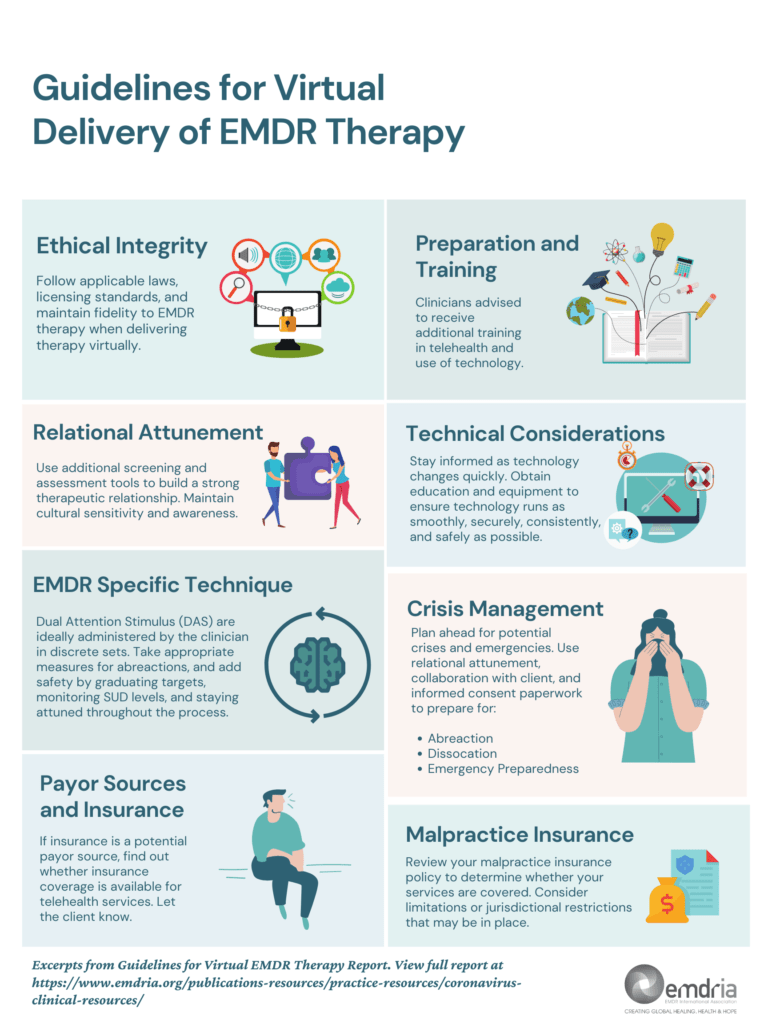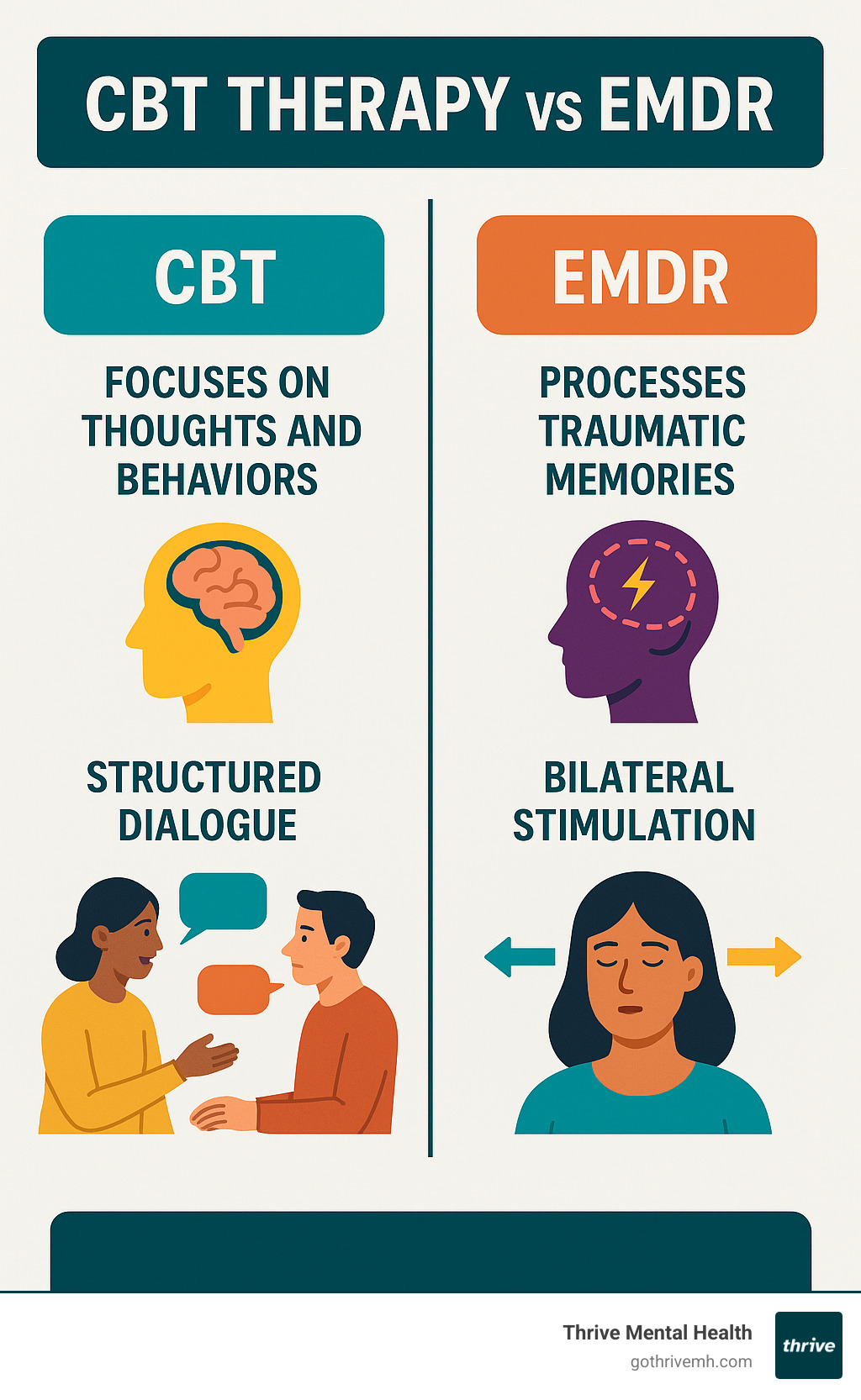Best emdr therapy in nyc guides clients process distressing experiences
Understanding EMDR Therapy: Discovering Its Benefits and Benefits for Psychological Wellness
EMDR treatment has arised as a notable strategy in the domain of psychological health, especially for those grappling with injury. Its organized technique of handling distressing memories establishes it apart from standard treatments. The potential enhancements it offers for different psychological challenges require closer exam. As individuals seek efficient remedies for their mental wellness, recognizing the subtleties of EMDR may offer essential insights into its advantages and applications. What exists beneath its therapeutic pledge?
What Is EMDR Treatment?
Eye Activity Desensitization and Reprocessing (EMDR) treatment is a structured method created to alleviate the distress connected with distressing memories. Established by Francine Shapiro in the late 1980s, EMDR integrates components of cognitive-behavioral treatment with reciprocal excitement, typically through directed eye motions - emdr therapy new york city. The treatment intends to aid people procedure and reframe distressing experiences, minimizing their psychological fee and influence on every day life
During EMDR sessions, clients recall distressing memories while simultaneously participating in specific reciprocal excitement methods. This double focus is thought to promote the mind's natural healing procedures, permitting for the combination of interrupted memories. EMDR is frequently employed to deal with problems like trauma (PTSD), anxiety, and anxiety. Its organized nature and adaptable framework make EMDR available to a varied variety of customers, supplying hope and alleviation from the problems of unresolved injury.
The Scientific research Behind EMDR
Understanding the devices underlying EMDR therapy reveals a remarkable interplay in between neurological reactions and emotional processes. Study suggests that EMDR turns on the brain's details processing system, facilitating the combination of traumatic memories. This procedure appears to engage the reciprocal stimulation frequently used in EMDR, which can assist re-shape neural pathways connected with distressing experiences.
Research studies have actually shown adjustments in mind task patterns during EMDR sessions, especially in locations associated with emotional law, such as the amygdala and prefrontal cortex. These changes recommend that EMDR might reduce the emotional fee of traumatic memories, thus enabling people to refine their experiences more adaptively.
Furthermore, neuroimaging researches highlight changes in the default mode network, which may contribute in how individuals associate with their memories. On the whole, the clinical exploration of EMDR underscores its potential effectiveness in promoting psychological health with an intricate communication of cognitive and neurological mechanisms.
How EMDR Works: The Process Explained
While numerous restorative techniques concentrate on verbal processing, EMDR utilizes an unique technique that integrates bilateral stimulation to facilitate healing. The procedure starts with the specialist aiding the customer determine upsetting memories or thoughts. Once these targets are established, the specialist overviews the customer with a collection of eye activities or various other types of bilateral stimulation, such as tapping or acoustic hints. This stimulation is believed to aid in refining the memories, enabling the brain to reprocess stressful experiences extra adaptively.
Throughout the sessions, customers may experience a variety of feelings and insights as they confront their memories. The specialist preserves a helpful environment, making certain the customer feels secure throughout the process. After the excitement, the therapist helps the customer show on any adjustments in their feelings or ideas relating to the targeted memories. This structured strategy aims to reduce the psychological charge linked with trauma, advertising a healthier psychological state.
Benefits of EMDR for Injury Recovery
EMDR treatment offers substantial benefits for people recovering from injury. It facilitates a sped up healing process, aiding clients procedure traumatic memories a lot more efficiently. Furthermore, it lowers emotional distress and boosts coping skills, encouraging individuals to handle their experiences much more properly.
Accelerated Healing Process
As people look for effective techniques for overcoming trauma, the sped up recovery procedure provided by EMDR therapy attracts attention as a transformative method. Unlike standard healing techniques that may take years to produce outcomes, EMDR promotes quick processing of terrible memories. This technique permits customers to challenge and incorporate agonizing experiences in an organized fashion, frequently resulting in developments within a couple of sessions. The reciprocal excitement integral in EMDR aids to desensitize people to traumatic memories, advertising a feeling of security and control. Clients regularly report significant reductions in trauma-related symptoms. By speeding up the healing journey, EMDR empowers people to redeem their lives and progress with renewed durability and hope, making it an important option for injury recuperation.
Minimized Psychological Distress
Emotional relief comes to be possible with the application of EMDR therapy in injury recuperation. This restorative method facilitates the handling of distressing memories, which commonly add to overwhelming psychological distress. By making use of bilateral stimulation, EMDR makes it possible for clients to access and reframe distressing experiences, minimizing their emotional cost. As people engage with their memories in a risk-free environment, they might experience a considerable decrease in anxiety, fear, and stress and anxiety associated with past traumas. In addition, EMDR promotes a feeling of safety and empowerment, enabling people to confront their emotions without coming to be overwhelmed. Because of this, customers often report an enhanced mood, fostering durability and a much more well balanced perspective on their lives. This reduction in emotional distress is an essential advantage of EMDR therapy.
Improved Coping Abilities
While injury can leave people really feeling powerless, EMDR therapy furnishes them with boosted coping abilities that facilitate resilience and personal growth. By attending to the origin of distress, EMDR helps clients identify and develop efficient methods to handle their psychological actions. These dealing skills include mindfulness, grounding techniques, and emotional regulation, which empower individuals to navigate challenging situations with greater convenience. As customers proceed via EMDR treatment, they discover to recycle distressing memories, transforming their understandings and decreasing feelings of anxiety and helplessness. This newfound capacity to deal not just aids in trauma recuperation yet additionally improves general mental health, bring about boosted connections and a more fulfilling life. Inevitably, EMDR cultivates a sense of agency that sustains long-lasting emotional health.
EMDR and Its Performance for Stress And Anxiety and Anxiety
EMDR therapy runs on the principle of reciprocal excitement, which may aid individuals process and reframe traumatic memories connected to anxiety and clinical depression. Research study indicates encouraging medical success prices, recommending that EMDR can be an effective treatment for these mental wellness conditions. Recognizing the underlying devices and results of EMDR gives insight right into its restorative possibility.
System of EMDR
Various studies have actually shown the efficiency of Eye Activity Desensitization and Reprocessing (EMDR) therapy in dealing with anxiety and anxiety. The device of EMDR involves reciprocal excitement, normally via directed eye activities, which facilitates the processing of traumatic memories. This dual interest permits people to reprocess terrible experiences while keeping an emphasis on the Full Report present, minimizing psychological disruption. EMDR aims to integrate fragmented memories, reducing their adverse psychological impact. Through structured stages, the treatment aids customers reframe their perceptions, fostering adaptive beliefs regarding themselves. This procedure not just eases signs and symptoms of anxiousness and clinical depression but also improves emotional policy, leading to improved psychological health. On the whole, EMDR's distinct strategy supplies an extensive structure for healing mental distress.

Scientific Success Rates
Study indicates that EMDR treatment has revealed exceptional success rates in relieving signs of anxiety and anxiety. Various research studies have actually demonstrated that people undergoing EMDR commonly experience significant reductions in traumatic signs within a reasonably short period. For example, a meta-analysis revealed that EMDR is as efficient as typical cognitive-behavioral therapy for treating both anxiousness and depression. On top of that, some clients report renovations after simply a couple of sessions. EMDR's effectiveness is associated to its special strategy, which helps reprocess terrible memories, causing reduced psychological distress. People regularly express high complete satisfaction with their therapy outcomes, noting improved emotional policy and general wellness. This evidence supports EMDR's growing recognition as an important therapeutic option for mental health practitioners.
Finding an EMDR Therapist: What to Consider
When looking for an EMDR therapist, what vital elements should one consider to ensure a good fit? Initially, browse this site it is necessary to validate the therapist's qualifications and qualifications, guaranteeing they are educated particularly in EMDR treatment. This training should be backed by acknowledged qualifications from respectable companies
Next, consider the therapist's experience, particularly with situations comparable to one's very own. Different specialists may have differing locations of focus and knowledge, which can substantially affect the healing procedure.
Another essential element is the specialist's technique and design. An excellent relationship and comfort level between the customer and specialist are vital for effective therapy.
Additionally, useful considerations such as session, location, and availability prices need to not be overlooked. By carefully evaluating these factors, people can make enlightened selections in their quest of EMDR therapy, enhancing their chances for effective psychological wellness outcomes.
Frequently Asked Inquiries
Can EMDR Treatment Be Utilized for Children and Adolescents?
Yes, EMDR therapy can be efficiently made use of for youngsters and teenagers. Research study suggests that it aids in refining distressing experiences, helping more youthful individuals develop coping approaches and enhance emotional law in a helpful atmosphere.
How much time Does an EMDR Therapy Session Typically Last?
An EMDR treatment session typically lasts between 60 to 90 minutes. The duration may differ based on healing goals and private demands, making sure that each session effectively attends to the client's certain experiences and challenges.
Is EMDR Therapy Covered by Insurance Policy Plans?
EMDR therapy insurance coverage varies by insurance coverage strategy. Some plans include it as part of psychological wellness benefits, while others may call for specific requirements to be fulfilled. People ought to consult their insurance coverage provider for in-depth details.
Are There Any Side Impacts of EMDR Treatment?

How Several Sessions of EMDR Treatment Are Normally Needed?
Commonly, people may need anywhere from six to twelve sessions of EMDR treatment, depending on the intricacy learn this here now of their trauma and individual progress (emdr therapy new york). Some might need added sessions for deeper concerns or ongoing assistance
Eye Movement Desensitization and Reprocessing (EMDR) therapy is an organized method made to reduce the distress linked with terrible memories. Psychological alleviation ends up being possible through the application of EMDR therapy in injury recovery. As clients advance via EMDR therapy, they discover to recycle traumatic memories, transforming their understandings and lowering feelings of stress and anxiety and vulnerability. EMDR treatment runs on the principle of bilateral stimulation, which might aid patients process and reframe upsetting memories connected to anxiousness and clinical depression. EMDR therapy may lead to short-term side impacts such as raised psychological distress, vivid memories, or physical discomfort during sessions.